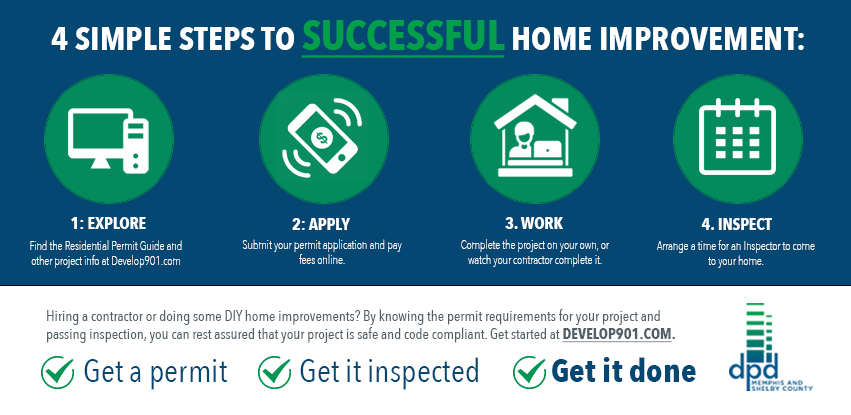
How can a homeowner do renovations on their own?
Tennessee state law allows for a homeowner to apply for permits if the homeowner lives in the home.
A company cannot apply for permits for multiple properties as a homeowner. A licensed contractor is required.
What types of projects require a permit?
For a better understanding of the different types of projects that do and do not require permits, use the Residential Permit Guide tool.
How can I find a licensed contractor?
Visit the Tennessee Department of Commerce and Insurance website to verify the license status of potential contractors and search for actively licensed contractors.
Contractors must also register with our office. You can confirm their status with our office by searching the Develop 901 Citizen Portal.
How do I schedule an inspection?
Inspections can be scheduled after permits have been issued using the Develop 901 Citizen Portal or the Interactive Voice Response (IVR) phone number at (901) 222-8400.
In most cases, the licensed contractor will schedule the necessary inspections. Ensure you are informed about which inspections are required. Confirm that your contractor has scheduled your inspections, and request the inspection results. You can also view inspection results using the Develop 901 Citizen Portal.
How would I know if I live in an historic district?
The Zoning Atlas and the Residential Permit Guide can indicate whether your address is within an historical district.
A Certificate of Appropriateness (COA), issued by the Memphis Landmarks Commissions, may be required before starting a residential project in an historical district. Local historical district maps, neighborhood contacts, and design guidelines are available for all historical districts.
To consult with an Urban Design and Preservation Planner prior to beginning the COA application process, contact the DPD Service Counter at (901) 636-6619.
Is my project considered a residential project?
The answer to this question is yes if
- The structure is a detached one-family dwelling;
- The structure is a detached two-family dwelling;
- The structure is a townhouse not taller than 3 stories.
What's the difference between a residential addition permit and a residential alteration permit?
An addition involves an extension or increase in floor area, number of stories, or height of a building or structure. Examples of an addition include converting a porch to a heated/cooled space, finishing a bonus room which has no heating and cooling, and adding a master suite.
An alteration is any construction, retrofit, or renovation to an existing structure other than a repair or an addition. This also includes a change in a building, electrical, gas, mechanical, or plumbing system that involves an extension, addition, or change to the arrangement, type, or purpose of the original installation. Examples of an alteration include creating an open floor plan by removing walls and framing for a new shower in a bathroom.
My permit expired, but I need to schedule an inspection. What do I do?
Call the DPD Service Center at (901) 636-7384 to speak with a Permit Technician. This staff member will look up and review the permit application in order to determine how to proceed.
To assist the Permit Technician in the search for your permit application, please have the property address or permit number ready to share.
What should I do if I have other questions?
The Residential Permit Guide is a great tool as you begin to research requirements for your projects. You can also call the DPD Service Center at (901) 636-7384 for Construction Enforcement related questions.


